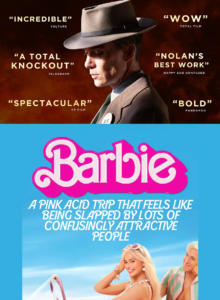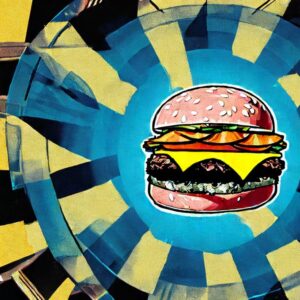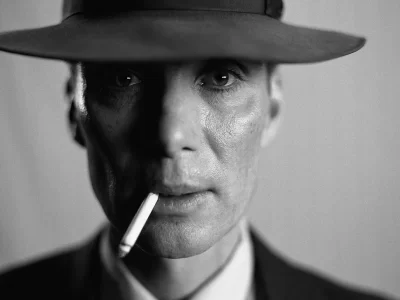Watch What You Want (We Need Junk Food Stories)
 After a few years of relative quietude from the highbrows, becalmed by the pandemic’s rocky release schedule, the elitist film critics began speaking up again last summer. “Oppenheimer is mythic, massive, and a masterful work […] the most important movie of the decade.” “Martin Scorsese wrestles with […] the original sin of America itself.” “David Fincher directs another thrilling sensory experience.”
After a few years of relative quietude from the highbrows, becalmed by the pandemic’s rocky release schedule, the elitist film critics began speaking up again last summer. “Oppenheimer is mythic, massive, and a masterful work […] the most important movie of the decade.” “Martin Scorsese wrestles with […] the original sin of America itself.” “David Fincher directs another thrilling sensory experience.”
And they don’t just crow about the auteurs; they also have some choice barbs for the crowd-pleasers. “[Barbie is] like staring deeply into a bowl of Lucky Charms.” “It is the laziest possible version of a Mario movie, and for most viewers, young and old, that’ll be totally acceptable.” “For the hard core Spiderman follower it is manna from Heaven; for the casual viewer it is almost impossible to figure out.”
And with Oppenheimer leading the 2023 Oscar nominations with 13 nominations, including Best Picture, the message seems to be pretty clear: “You foolish audiences, you don’t know what you really want.” And it’s only getting worse since the one-two punch of high-profile Hollywood strikes dried up all the new popcorn films, leaving the well slow to refill, while the artsy studios and the fartsy studios that were willing to be reasonable continue to put out new, complex works.
Of course, as media commentators and even critics ourselves, we’ve been known to get in on the highbrow glasses-pushing reviews as well. And yes, our difficult and ugly world needs art, excellence, craft, and beauty. But there’s an undercurrent of snobbery that’s risen to the surface in recent months; a pseudo-intellectual navel-gazing that seems to be trying to assign moral values to films based on their complexity, whether they’ve eschewed CGI, or if they avoid “franchise fatigue.”
Balderdash. Don’t listen to them. Our greatest need isn’t complexity, it’s story. Watch what you want.
Made of Story
Our universe is woven through with story. Every fiber of it echoes with the words used to spin it all into existence, a booming “let there be light,” and as a part of the universe we’re no exception; we don’t just tell stories, we need them. As surely as we’re made of water, we’re made of story. And that’s why we find stories in everything, even going so far as to anthropomorphize inanimate objects to tell them; if there isn’t a story, we’ll invent one.
This is no mistake. It’s how we’re made, on purpose.
 But that’s not to say that all stories are created equal, or fill our need in the same way. If stories are meals, some of them are lovingly hand-crafted by a loved one, from fresh ingredients according to an antique recipe handed down through the generations—while others are a fast-food cheeseburger that’s been under the heat lamp for a while.
But that’s not to say that all stories are created equal, or fill our need in the same way. If stories are meals, some of them are lovingly hand-crafted by a loved one, from fresh ingredients according to an antique recipe handed down through the generations—while others are a fast-food cheeseburger that’s been under the heat lamp for a while.
Now, it might sound like I’m saying we need the story equivalent of junk food sometimes. And let me be clear: yes, that’s exactly what I’m saying.
And why not? We always have. Shakespeare wasn’t highbrow in his day; he was writing the 16th-century equivalent of The Fast and The Furious franchise. Ancient Greek playwright Euripides, whose work is now a staple of study for drama students, was derided by his contemporary Aristophanes as contributing to the decline of standards in both tragedy and society as a whole.
Yet those are considered classics today; Shakespeare’s work is part of the English canon, and extant works by Euripides are still inspiring debate and criticism. These works were intended as simple stories and crowd-pleasers, but they didn’t stand the test of time in spite of their “popcorn-munching” nature. They still have things to say today because of it.
Easy Story for a Hard Life
Crowd-pleasers are crowd-pleasers for a reason, and that reason is simplicity.
The world we live in is various shades of gray; sometimes the stories we need are black-and-white, with huge splashes of garish color.
The world we live in is unfriendly and unsatisfying; sometimes we need stories that will resolve definitively and happily.
We need clear and obvious analogies. We need complicated characters to become uncomplicated. We need contrived stories and plot holes and single-note characters.
We live in a world of complicated characters with difficult motivations; sometimes an arch villain with obvious motivations and horrifying goals is a balm.
But simple stories don’t have to be mindless; well-written but simple stories still show us the interesting sides of characters, allowing us an empathetic look into a different life and unexpected ideas. They give us an opportunity to play with concepts, and cope with hard things by inserting ourselves briefly into easier stories. In other words, they have things to say.
 And stories with simple elements don’t have to be all simple; the Marvel Cinematic Universe tore up the entire action movie playbook and dominated the cultural conversation for over a decade by mostly trading in shallow-end tropes, but sneaking unexpected depth into the story; a surprisingly layered character relationship, for instance, as in the case of Thor and Loki; or a villain motivation like Killmonger’s that seems, at first glance, to be right. But in all of these cases, the complexities of the characters boil down to a simple reality and denouement: the villain is going to hurt a lot of people. The hero has to stop them.
And stories with simple elements don’t have to be all simple; the Marvel Cinematic Universe tore up the entire action movie playbook and dominated the cultural conversation for over a decade by mostly trading in shallow-end tropes, but sneaking unexpected depth into the story; a surprisingly layered character relationship, for instance, as in the case of Thor and Loki; or a villain motivation like Killmonger’s that seems, at first glance, to be right. But in all of these cases, the complexities of the characters boil down to a simple reality and denouement: the villain is going to hurt a lot of people. The hero has to stop them.
In short, life is complex. Simple stories help us cope.
But even more than that, we need stories that let us hope for more.
A Bright and Shining Wonder
C.S. Lewis famously said of children, “Since it is so likely that they will meet cruel enemies, let them at least have heard of brave knights and heroic courage.” But, Clive Staples, why should children be the only ones to benefit from such an observation?
In fact, I think Lewis would (and did!) wholeheartedly agree that what is good in stories for children is also good in stories for the grown. And he further expounds on his initial idea:
[To try to keep from a child] the knowledge that he is born into a world of death, violence, wounds, adventure, heroism and cowardice, good and evil […] would indeed be to give children a false impression and feed them on escapism in the bad sense. There is something ludicrous in the idea of so educating a generation which is born to the Ogpu and the atomic bomb. Since it is so likely that they will meet cruel enemies, let them at least have heard of brave knights and heroic courage. Otherwise you are making their destiny not brighter but darker. […] Let there be wicked kings and beheadings, battles and dungeons, giants and dragons, and let villains be soundly killed at the end of the book.
—C.S. Lewis, On Stories: And Other Essays on Literature
We turn to stories for a world that is turned up louder; one that sings the song of our world, but with different voices and dissonances, and a higher volume. We need to see goodness and evil, darkness and light, in powerful enough measures that we can imagine a world where good has won and evil has been decisively defeated, and where the mundanity of our fallen existence succumbs to the wonder of power and beauty. In our real, grounded, disconnected, mundane desert, we need a fantastic, untethered, connected, spectacular world lush with magic; because that fiction gives us hope that the mundane could become fantastic.
Because, behind the veil, it really is.
God’s Kingdom truly is that fantastic, beautiful, spectacular world; and whether we see echoes of that greater reality in a fantasy world that promises wizards and dragons, in a superhero world dominated by capes and mutants, in a romantic comedy world abuzz with meet-cutes and hilarious misunderstandings, in a sci-fi world of rocket ships and ray guns, or in a sport drama world that platforms feats of strength and speed, there’s real value in being able to see a lush world awash in some kind of wonder; whether arcane or ordinary.
That’s why I have little patience with the argument that our world needs more Scorsese and less Star Wars; for my money, anything that awakens that hopeful spirit of lush magic within you is worthwhile entertainment.
The God who Connects the Spectacular and the Mundane
 But shouldn’t we strive for and expect excellence? Wasn’t the church’s role in art and science patronage a contributing factor to the Renaissance? Am I just doing the same thing that I disdain about Christian movie discourse, when they espouse an uncritical happiness with—and enjoyment of—whatever sludge we happen to be served?
But shouldn’t we strive for and expect excellence? Wasn’t the church’s role in art and science patronage a contributing factor to the Renaissance? Am I just doing the same thing that I disdain about Christian movie discourse, when they espouse an uncritical happiness with—and enjoyment of—whatever sludge we happen to be served?
Well obviously I wouldn’t be writing this article if I thought the answer was “yes!”
Obviously all art is subjective, but there’s a difference between a quality story and a simple story. “What makes a good story?,” like “what is beauty?,” is a subjective minefield that could be answered with a different 1500-word article by every single human on the planet, but for most people the basics boil down to this:
- The characters are strong and relatable
- The world reflects our own
- The plot and events affect us emotionally and/or intellectually
Notice that a story’s simplicity or complexity doesn’t have anything to do with any of those points. The most complex story in the world could still have a boring protagonist and feel like a slog, and the simplest story on the shelf could engage with our emotions and intellect so strongly that it sticks with us for months.
But even more than that, the God we worship himself bridged the gap between the spectacular and the mundane, and He didn’t use a highly-rated Greek tragedy or a five-star Christopher Nolan movie to do it. So I think that Christians, particularly, should demand good, beautiful stories, told with technical skill and incarnated with meaning. Some of them will be complex, and some of them will be simple. But we worship a God who has told both; and the best stories will echo His own, whether they’re told in the form of a 3-hour epic about ennui that doesn’t use any CGI, or a humble board book.







